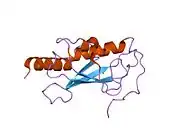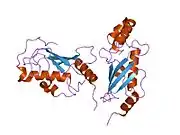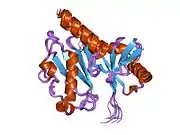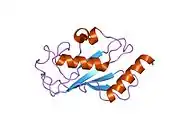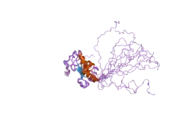UBE2V2
Ubiquitin-conjugating enzyme E2 variant 2 is a protein that in humans is encoded by the UBE2V2 gene.[5][6] Ubiquitin-conjugating enzyme E2 variant proteins constitute a distinct subfamily within the E2 protein family.
Structure
UBE2V2 has sequence similarity to other ubiquitin-conjugating enzymes but lack the conserved cysteine residue that is critical for the catalytic activity of E2s. The protein encoded by this gene also shares homology with ubiquitin-conjugating enzyme E2 variant 1 and yeast MMS2 gene product.[7]
Function
UBE2V2 has also been implicated as an intracellular sensor of reactive electrophilic species, which are present in high levels during periods of pathogenic and/or environmental stress.[8] The C69 residue of UBE2V2 is capable of binding with various RES. It has been shown that binding of RES to UBE2V2 promotes UBE2V2-mediated activation of Ube2N, another E2 protein that complexes with UBE2V2. Activated Ube2N has been shown to play a major role in promoting DNA-damage responses. Thus, UBE2V2 may promote genome integrity by directly sensing RES and effecting DNA damage responses.[9] It may also be involved in the differentiation of monocytes and enterocytes.[7]
Interactions
UBE2V2 has been shown to interact with HLTF.[10] Although UBE2V2 itself lacks ubiquitin-conjugating activity, it can interact with different Ubiquitin-conjugating enzymes to facilitate their catalytic activities.[11] For instance, UBE2V2 can complex with UBE2N to form a heterodimer capable of synthesizing Lys-63 linked polyubiquitin chains.[12] UBE2V2 may facilitate UBE2N activity by coordinating UBE2N's positioning to promote ubiquitin chain formation specifically at Lys-63, as the ubiquitin molecule has multiple potential Lysine binding sites.[13] Similarly, it has been shown that UBE2V2 interact with the ubiquitin-conjugating enzyme, Ubc13, to induce Ubc13 to adopt an active conformation that can create Lys-63 polyubituitin chains on various substrates.[14]
Addition of Lys-63 polyubiquitin chains to intracellular targets is distinct from the canonical Lys-48 polyubiquitin chains in that Lys-63 chains do not mediate proteasomal degradation of its substrate.[15] Although their function remains poorly characterized, Lys-63 chains have been shown to regulate signaling pathways by either activating or inhibiting its target protein function.[16] For example, TRIM5alpha restriction of retroviral reverse-transcription is dependent on UBE2V2/UBE2N-mediated poly-ubiquitination.[17] UBE2V2 has been shown to regulate TRIM21 antiviral activity in an analogous manner.[18]
References
- GRCh38: Ensembl release 89: ENSG00000169139 - Ensembl, May 2017
- GRCm38: Ensembl release 89: ENSMUSG00000022674 - Ensembl, May 2017
- "Human PubMed Reference:". National Center for Biotechnology Information, U.S. National Library of Medicine.
- "Mouse PubMed Reference:". National Center for Biotechnology Information, U.S. National Library of Medicine.
- Sancho E, Vilá MR, Sánchez-Pulido L, Lozano JJ, Paciucci R, Nadal M, Fox M, Harvey C, Bercovich B, Loukili N, Ciechanover A, Lin SL, Sanz F, Estivill X, Valencia A, Thomson TM (January 1998). "Role of UEV-1, an inactive variant of the E2 ubiquitin-conjugating enzymes, in in vitro differentiation and cell cycle behavior of HT-29-M6 intestinal mucosecretory cells". Molecular and Cellular Biology. 18 (1): 576–89. doi:10.1128/mcb.18.1.576. PMC 121525. PMID 9418904.
- Fritsche J, Rehli M, Krause SW, Andreesen R, Kreutz M (June 1997). "Molecular cloning of a 1alpha,25-dihydroxyvitamin D3-inducible transcript (DDVit 1) in human blood monocytes". Biochemical and Biophysical Research Communications. 235 (2): 407–12. doi:10.1006/bbrc.1997.6798. PMID 9199207.
- "Entrez Gene: UBE2V2 ubiquitin-conjugating enzyme E2 variant 2".
- Farmer EE, Davoine C (August 2007). "Reactive electrophile species". Current Opinion in Plant Biology. 10 (4): 380–6. doi:10.1016/j.pbi.2007.04.019. PMID 17646124.
- Zhao Y, Long MJ, Wang Y, Zhang S, Aye Y (February 2018). "Ube2V2 Is a Rosetta Stone Bridging Redox and Ubiquitin Codes, Coordinating DNA Damage Responses". ACS Central Science. 4 (2): 246–259. doi:10.1021/acscentsci.7b00556. PMC 5833000. PMID 29532025.
- Unk I, Hajdú I, Fátyol K, Hurwitz J, Yoon JH, Prakash L, Prakash S, Haracska L (March 2008). "Human HLTF functions as a ubiquitin ligase for proliferating cell nuclear antigen polyubiquitination". Proceedings of the National Academy of Sciences of the United States of America. 105 (10): 3768–73. doi:10.1073/pnas.0800563105. PMC 2268824. PMID 18316726.
- Stewart MD, Ritterhoff T, Klevit RE, Brzovic PS (April 2016). "E2 enzymes: more than just middle men". Cell Research. 26 (4): 423–40. doi:10.1038/cr.2016.35. PMC 4822130. PMID 27002219.
- Fletcher AJ, Christensen DE, Nelson C, Tan CP, Schaller T, Lehner PJ, Sundquist WI, Towers GJ (August 2015). "TRIM5α requires Ube2W to anchor Lys63-linked ubiquitin chains and restrict reverse transcription". The EMBO Journal. 34 (15): 2078–95. doi:10.15252/embj.201490361. PMC 4551353. PMID 26101372.
- Eddins MJ, Carlile CM, Gomez KM, Pickart CM, Wolberger C (October 2006). "Mms2-Ubc13 covalently bound to ubiquitin reveals the structural basis of linkage-specific polyubiquitin chain formation". Nature Structural & Molecular Biology. 13 (10): 915–20. doi:10.1038/nsmb1148. PMID 16980971. S2CID 6757737.
- Branigan E, Plechanovová A, Jaffray EG, Naismith JH, Hay RT (August 2015). "Structural basis for the RING-catalyzed synthesis of K63-linked ubiquitin chains". Nature Structural & Molecular Biology. 22 (8): 597–602. doi:10.1038/nsmb.3052. PMC 4529489. PMID 26148049.
- Fletcher AJ, Christensen DE, Nelson C, Tan CP, Schaller T, Lehner PJ, Sundquist WI, Towers GJ (August 2015). "TRIM5α requires Ube2W to anchor Lys63-linked ubiquitin chains and restrict reverse transcription". The EMBO Journal. 34 (15): 2078–95. doi:10.15252/embj.201490361. PMC 4551353. PMID 26101372.
- "UBE2N - Ubiquitin-conjugating enzyme E2 N - Homo sapiens (Human) - UBE2N gene & protein". www.uniprot.org. Retrieved 2018-04-06.
- Fletcher AJ, Christensen DE, Nelson C, Tan CP, Schaller T, Lehner PJ, Sundquist WI, Towers GJ (August 2015). "TRIM5α requires Ube2W to anchor Lys63-linked ubiquitin chains and restrict reverse transcription". The EMBO Journal. 34 (15): 2078–95. doi:10.15252/embj.201490361. PMC 4551353. PMID 26101372.
- Fletcher AJ, Mallery DL, Watkinson RE, Dickson CF, James LC (August 2015). "Sequential ubiquitination and deubiquitination enzymes synchronize the dual sensor and effector functions of TRIM21". Proceedings of the National Academy of Sciences of the United States of America. 112 (32): 10014–9. doi:10.1073/pnas.1507534112. PMC 4538650. PMID 26150489.
Further reading
- Xiao W, Lin SL, Broomfield S, Chow BL, Wei YF (September 1998). "The products of the yeast MMS2 and two human homologs (hMMS2 and CROC-1) define a structurally and functionally conserved Ubc-like protein family". Nucleic Acids Research. 26 (17): 3908–14. doi:10.1093/nar/26.17.3908. PMC 147796. PMID 9705497.
- Hofmann RM, Pickart CM (March 1999). "Noncanonical MMS2-encoded ubiquitin-conjugating enzyme functions in assembly of novel polyubiquitin chains for DNA repair". Cell. 96 (5): 645–53. doi:10.1016/S0092-8674(00)80575-9. PMID 10089880. S2CID 17117789.
- Chan NL, Hill CP (August 2001). "Defining polyubiquitin chain topology". Nature Structural Biology. 8 (8): 650–2. doi:10.1038/90337. PMID 11473244. S2CID 16579945.
- Moraes TF, Edwards RA, McKenna S, Pastushok L, Xiao W, Glover JN, Ellison MJ (August 2001). "Crystal structure of the human ubiquitin conjugating enzyme complex, hMms2-hUbc13". Nature Structural Biology. 8 (8): 669–73. doi:10.1038/90373. PMID 11473255. S2CID 23504541.
- Gevaert K, Goethals M, Martens L, Van Damme J, Staes A, Thomas GR, Vandekerckhove J (May 2003). "Exploring proteomes and analyzing protein processing by mass spectrometric identification of sorted N-terminal peptides". Nature Biotechnology. 21 (5): 566–9. doi:10.1038/nbt810. PMID 12665801. S2CID 23783563.
- Bothos J, Summers MK, Venere M, Scolnick DM, Halazonetis TD (October 2003). "The Chfr mitotic checkpoint protein functions with Ubc13-Mms2 to form Lys63-linked polyubiquitin chains". Oncogene. 22 (46): 7101–7. doi:10.1038/sj.onc.1206831. PMID 14562038.
- Zhou H, Wertz I, O'Rourke K, Ultsch M, Seshagiri S, Eby M, Xiao W, Dixit VM (January 2004). "Bcl10 activates the NF-kappaB pathway through ubiquitination of NEMO". Nature. 427 (6970): 167–71. doi:10.1038/nature02273. PMID 14695475. S2CID 4429582.
- Simpson LJ, Sale JE (April 2005). "UBE2V2 (MMS2) is not required for effective immunoglobulin gene conversion or DNA damage tolerance in DT40". DNA Repair. 4 (4): 503–10. doi:10.1016/j.dnarep.2004.12.002. PMID 15725630.
- Pastushok L, Moraes TF, Ellison MJ, Xiao W (May 2005). "A single Mms2 "key" residue insertion into a Ubc13 pocket determines the interface specificity of a human Lys63 ubiquitin conjugation complex". The Journal of Biological Chemistry. 280 (18): 17891–900. doi:10.1074/jbc.M410469200. PMID 15749714.
- Spyracopoulos L, Lewis MJ, Saltibus LF (June 2005). "Main chain and side chain dynamics of the ubiquitin conjugating enzyme variant human Mms2 in the free and ubiquitin-bound States". Biochemistry. 44 (24): 8770–81. doi:10.1021/bi050065k. PMID 15952783.
- Andersen PL, Zhou H, Pastushok L, Moraes T, McKenna S, Ziola B, Ellison MJ, Dixit VM, Xiao W (August 2005). "Distinct regulation of Ubc13 functions by the two ubiquitin-conjugating enzyme variants Mms2 and Uev1A". The Journal of Cell Biology. 170 (5): 745–55. doi:10.1083/jcb.200502113. PMC 2171356. PMID 16129784.
- Stelzl U, Worm U, Lalowski M, Haenig C, Brembeck FH, Goehler H, Stroedicke M, Zenkner M, Schoenherr A, Koeppen S, Timm J, Mintzlaff S, Abraham C, Bock N, Kietzmann S, Goedde A, Toksöz E, Droege A, Krobitsch S, Korn B, Birchmeier W, Lehrach H, Wanker EE (September 2005). "A human protein-protein interaction network: a resource for annotating the proteome". Cell. 122 (6): 957–68. doi:10.1016/j.cell.2005.08.029. hdl:11858/00-001M-0000-0010-8592-0. PMID 16169070. S2CID 8235923.
- Wen R, Newton L, Li G, Wang H, Xiao W (May 2006). "Arabidopsis thaliana UBC13: implication of error-free DNA damage tolerance and Lys63-linked polyubiquitylation in plants". Plant Molecular Biology. 61 (1–2): 241–53. doi:10.1007/s11103-006-0007-x. PMID 16786304. S2CID 8437446.
- Zhao GY, Sonoda E, Barber LJ, Oka H, Murakawa Y, Yamada K, Ikura T, Wang X, Kobayashi M, Yamamoto K, Boulton SJ, Takeda S (March 2007). "A critical role for the ubiquitin-conjugating enzyme Ubc13 in initiating homologous recombination". Molecular Cell. 25 (5): 663–75. doi:10.1016/j.molcel.2007.01.029. PMID 17349954.






